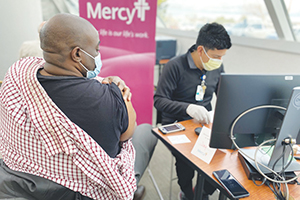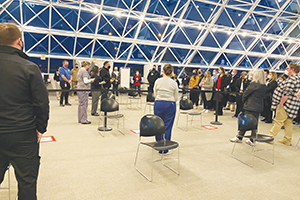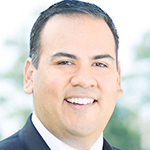By LISA EISENHAUER
When the first doses of vaccine arrived, Mercy Hospital Oklahoma City was in the throes of a COVID-19 patient surge. At one point, patients with COVID occupied almost half its 379 beds.

Jay Cabrera, a nurse manager at Mercy Hospital Oklahoma City, prepares to vaccinate a patient at the hospital's clinic. The hospital has given enough vaccines to cover 15% of the city's population.
The hospital's staff might have been forgiven if, after months of extra shifts and the heightened stress of caring for a deluge of extremely ill patients, they didn't jump at the chance to work even more hours administering the vaccine. But that's just what they did.
By late April, the hospital, in partnership with its Mercy Clinic and the local health department, had administered more than 61,000 doses of vaccine, most of them through its vaccine clinic but some through two retail pharmacies it runs. Its vaccines have covered 15% of the Oklahoma City population.
Hop to it
The hospital jump-started its plan to open a clinic for frontline workers when the hospital's first shipment of vaccine arrived two days ahead of schedule on the morning of Dec. 15. By 3 p.m., nurses were getting shots into the arms of their co-workers.
"Really, from that point forward, it was learn as you go and huddle together at the end of the day and say, 'What went well today, what are some opportunities, and what can we change?'" says Shane Edmonson, the hospital's executive director of pharmacy.

People assisting at a vaccine clinic in January at Mercy Hospital Oklahoma City take part in a huddle to discuss practices and procedures before patients begin arriving.
Among the learnings has been how to schedule vaccines, how to give them in an efficient way in which patients feel safe and respected, and how to prevent any doses from going to waste, Edmonson says. Within a few weeks, the hospital had finetuned its process to the point where staff could give 3,000 vaccines a day.
Early on, when the hospital was focused on getting its workers vaccinated, it ran a clinic that was open seven days a week. Staff volunteered for four-hour overtime shifts, oftentimes after they already had worked their regular hospital shifts. That effort continued into January with as many as 300 workers a day being vaccinated.
On Jan. 7, the hospital teamed up with the Oklahoma City-County Health Department to hold the first public vaccine clinic in the county. With the help of hundreds of paid staff and community volunteers, the clinic administered 1,200 vaccines in one day.
Shortly after that, the hospital opened its own vaccine clinic for the public, again with paid staff volunteering for shifts. The clinic is in the lobby of the Meinders NeuroScience Institute on the hospital campus. The lobby has lots of open space for social distancing. The clinic has administered 15% of all vaccines given by the Mercy system.
All hands on deck
In addition to clinicians giving shots, the staffers volunteering for shifts at the clinic include professionals pitching it to do whatever is necessary. Administrators, pharmacists, ethics specialists and spiritual leaders have stepped up to coordinate parking, set up the vaccine booths, greet patients and take on the various other duties.

Argueta
David Argueta, the hospital's chief administrative officer, has spent many hours at the clinic running logistics, directing traffic, wiping chairs with disinfectant between patients and doing other essential chores.
"There were times when we would reflect in the morning or in the evenings after we were done with a 14- or 16-hour day and all you could really think was how grateful you were to be a part of this and see how happy people were the first time they got their shot," he says. "People would cry, they would cheer."

Edmonson
Edmonson says one of the first challenges of the public vaccine effort was to figure out how to schedule appointments. At first, the hospital relied on the state's system and then on one set up by the county. The hospital later transitioned to a system Mercy created that is incorporated into the hospital's Epic electronic records.
Staff training has included how to use the scheduling system as well as how to perform their roles at the clinics, such as administering the shots, filling out the necessary forms and moving patients through the process.
"It was the epitome of teamwork and everyone centered on a cause that was greater than ourselves," says Argueta. "We were focused, guided by our mission, guided by our values, and tried to embody those in everything we did in this effort."
Plan, try, revise
As facilities across Mercy started vaccine clinics, the system had daily calls at 7 a.m. for the people running the clinics to share best practices, such as how to efficiently and safely guide patients through the process, and introduce new policies to staff. At 8 a.m., Edmonson and others in charge of the vaccine effort in Oklahoma City would meet with their colleagues to figure out how to incorporate the system's practices and make adjustments that they had come up with on their own.
"We would introduce some of those changes, work through that day and then learn for the next day," he says.
Edmonson says ideas for improvements to the process have been welcomed from anyone involved. Among the innovations that have been put in place was a revision of the parking system for patients coming to Meinders NeuroScience Institute for shots. After seeing the backup from cars pulling into or leaving the 180-space lot, a hospital vice president came up with a traffic flow plan that made the process much smoother, Edmonson says.
Another adjustment was to set up private spaces at the clinic for patients who have had a history of bad reactions to shots and to provide extra monitoring for those patients.
While the clinics have been by appointment, if doses are available, no one who shows up and qualifies for a vaccine gets turned away, Edmonson says. Mercy Hospital Oklahoma City leaders made the decision early on not to give vaccine priority to Mercy patients. "We are going to take care of anyone," he says of vaccines.
In recent weeks, demand for vaccines has tapered off, so Mercy Hospital Oklahoma City has reduced its standing clinic to three days a week. The clinic can give up to 600 shots a day and the two pharmacies that offer shots can give up to 300 a week. As of early May, one-third of Oklahoma County residents were fully vaccinated.
Edmonson says the big effort now is to overcome vaccine hesitancy in the community. To do that, the hospital has teamed up with public health officials and with other local care providers to create a public awareness campaign focusing on the vaccines' safety and effectiveness.
Pain and solace
Argueta says he and his colleagues are always mindful that people coming to the clinic might have never before come to a Mercy facility for care. The care providers try to ensure that all patients have a positive experience.
"That is one of the things I'm most proud of, that that is at the forefront," he says. "We aren't focused on stewardship or money. It is really about doing good, doing good for the community, as a core of health care, a core of community health."
To keep the patients' needs top of mind, Argueta says people who have gotten the vaccine sometimes are invited to join the end-of-the-day huddles with those who have run the clinic. One woman who did so had lost both of her parents to COVID.
"She came and spoke to our team and just expressed her gratefulness and just how thankful she was to be able to get the vaccine because of all that she and her family had gone through," Argueta says. "Those stories will stay with us forever. In a time when there is so much pain and loss, there is a feeling of gratitude."